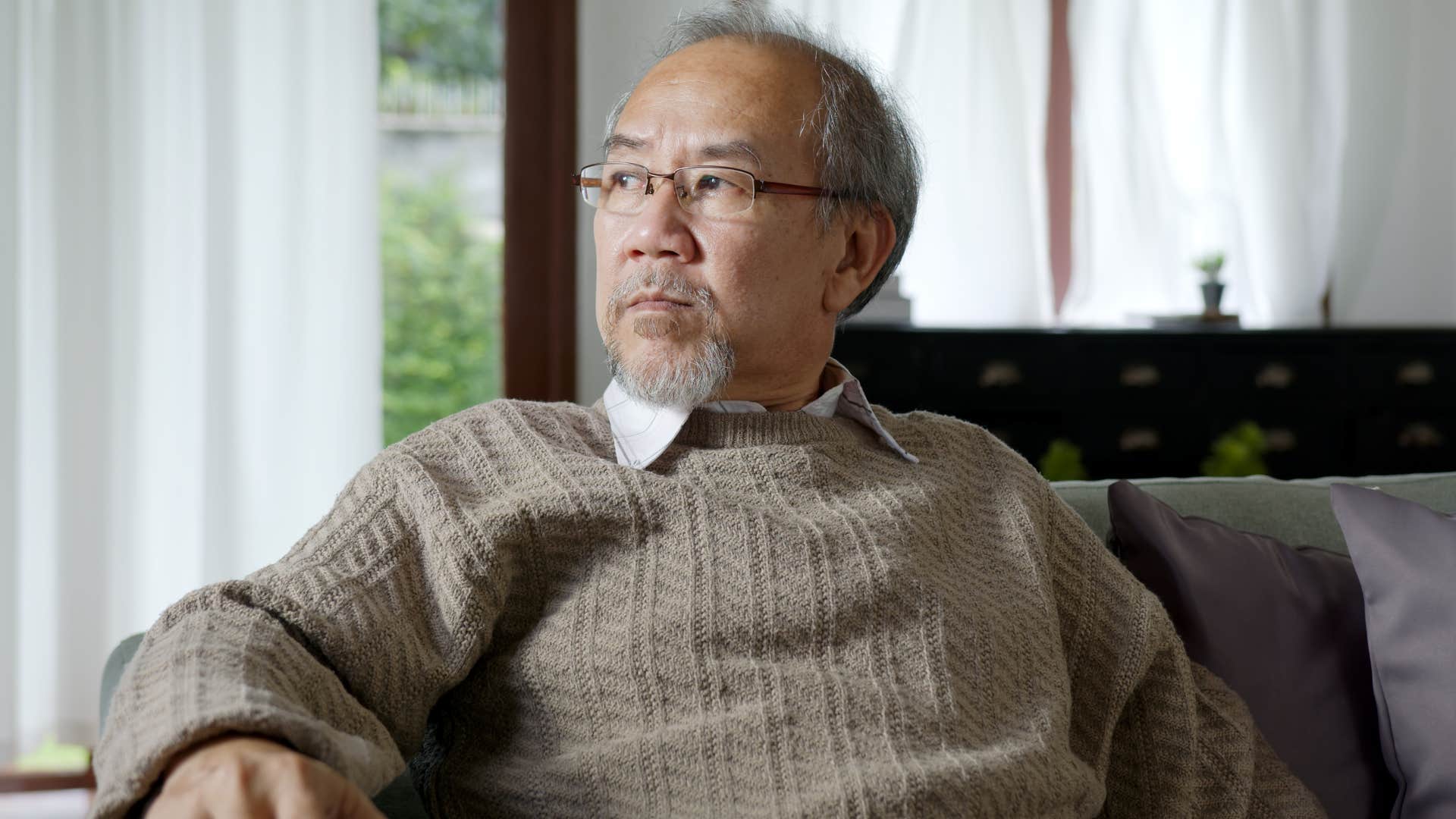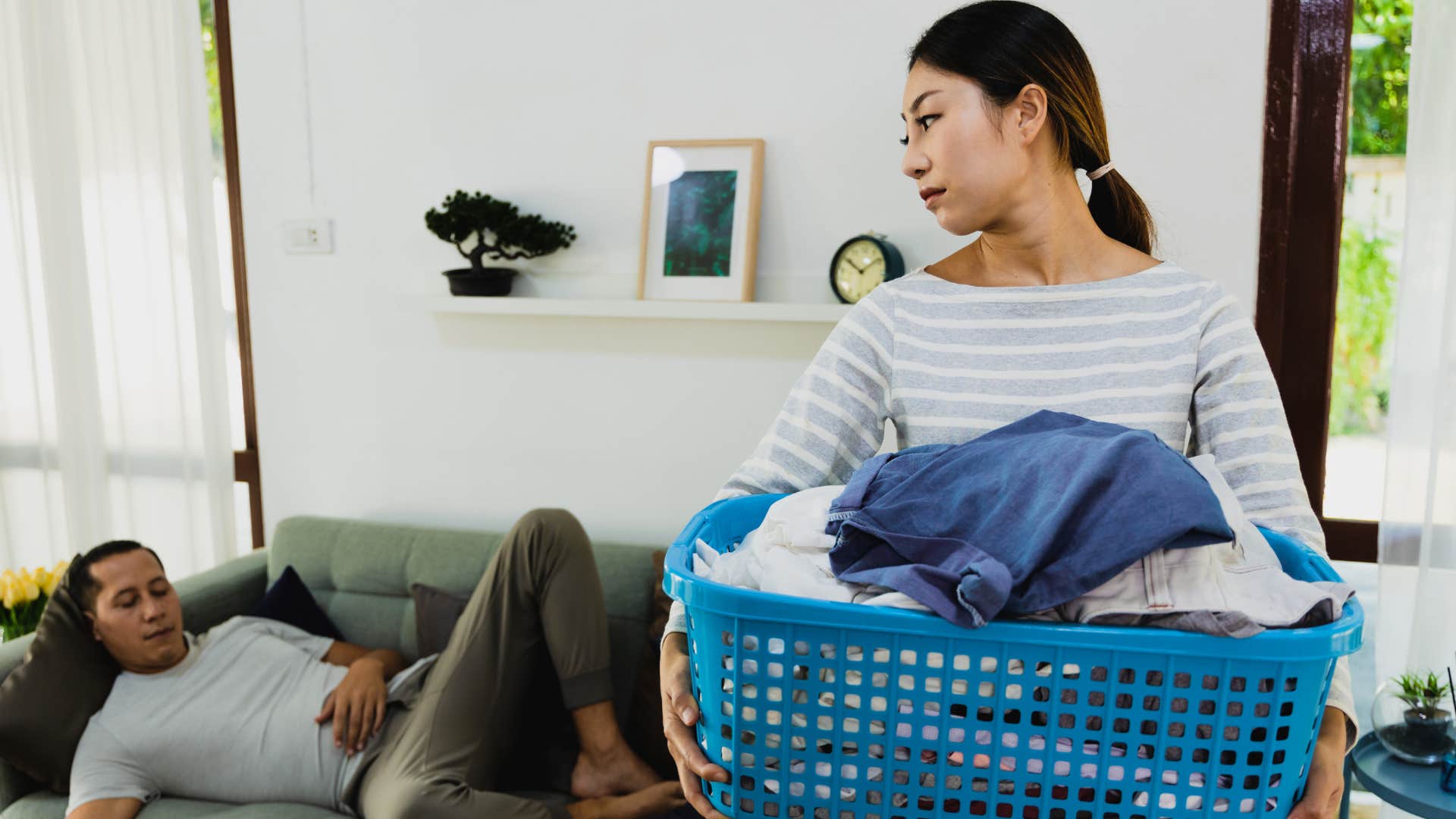Men Who Fall Out Of Love With Their Wives As They Get Older Usually Do These 11 Things At Home
If your husband's acting more like a roommate than a partner, these signs might explain why.
 eukukulka | Shutterstock
eukukulka | Shutterstock While “positive” emotional behaviors like validation and enthusiasm generally grow in marriages with age, for both husbands and wives, according to a study from the Emotion journal, while other “negative” ones like defensiveness and fear decrease, people can fall out of love. As their internal clarity, self-esteem, and personal values evolve, it’s also possible for romantic love to shift — sometimes not in the ways we’d expect or hope in our relationships.
While this loss of love is generally defined and discussed in the framework of large life events like break-ups and divorces, the subtle things partners do in their daily lives, within passing moments, at home, can be just as symbolic of broken romantic love — especially for men. Men who fall out of love with their wives as they get older usually do these things at home — from shifting household responsibilities, to leaving early, and even passing up on quality time.
Men who fall out of love with their wives as they get older usually do these 11 things at home:
1. They start behaving like a roommate
 Fizkes | Shutterstock.com
Fizkes | Shutterstock.com
Men tend to value romantic relationships more than their female counterparts, according to a study from the Behavioral and Brain Sciences journal, but they also tend to suffer more serious consequences when they experience a loss of this romantic love and intimacy. So, when they start to feel unloved, unheard, or unappreciated by their wives, it’s not surprising that they pull away, avoid the vulnerability that’s already a battle for many to achieve, and start acting like a roommate in their own home.
While feeling like best friends or navigating a “roommate” phase in the beginning of a marriage are all normal experiences for many couples, simply co-existing, rather than bonding and cultivating intimacy together, at home, can make people feel unvalued by their partners. For many men, it’s doing the bare minimum — they communicate when a surface-level something needs to be done, do their household chores, and check in like they would with a college roommate, rather than with a marital partner.
For some men, this roommate phase is an indicator of other life situations — like chronic stress from work or internal conflict — where the monotony and mundanity of everyday life disconnects them from their partner and sabotages healthy communication. However, for men who fall out of love with their wives as they get older, this behavior is likely a response to other losses of intimacy, romantic love, or connection.
2. They avoid confrontation and conflict
 Prostock-studio | Shutterstock.com
Prostock-studio | Shutterstock.com
While studies show that men are typically more willing to forgive and make peace following conflict or arguments than their female counterparts, in long-term relationships plagued by a loss of love, they generally avoid confrontation entirely.
Especially considering it’s typically women in relationships that do the emotional labor of supporting their partners’ vulnerability, crafting guidelines for conversations and conflict, and shifting their own emotional needs to give their partner more space, it’s not surprising that their partners will avoid conflict when they’ve lost this guidance in the face of dwindling romantic love.
Surprisingly, it’s not just the loss of support from their wives that fully contributes to this behavior at home. As they get older, many men also tend to lose support from their families and social circles, according to a study from the Psychology and Aging journal, which can explain why they may avoid conflict at home to protect their peace.
3. They stop having deep conversations
 Chay_Tee | Shutterstock.com
Chay_Tee | Shutterstock.com
In addition to avoiding conflict and confrontation with dwindling support from their social networks and their wives as they get older, men also may stop having deep conversations at home.
While longevity is often painted as a marker of relationship health, a study from the Family Relations journal argues that it’s actually practices — like vulnerability, communication, and trust — that define the well-being of long-term marriages and connections.
To grow together, evolve through hard times, and come back together after conflict, partners have to be willing to work toward the future together — not on separate teams. If a man — whose personal self-esteem and values have grown with age, sometimes in different ways from their partner — doesn’t see a future with their wife anymore, they may be less motivated to have these hard and uncomfortable conversations on a regular basis.
4. They question everything
 Inside Creative House | Shutterstock.com
Inside Creative House | Shutterstock.com
Many of the petty arguments, little jabs, and subtle resentments that plague couples with a loss of romantic love come from midlife crises and questioning amongst partners. As they get older, especially men, they may start to question the values, choices, and decisions they made earlier in life, taking on the emotional burdens and chronic stress that often follow this uncertainty.
Even if they’re intentionally questioning their relationships, the breakdown of intimacy and connectedness in a marriage that follows tends to amplify their internal and emotional turmoil — leaving them feeling disconnected, anxious, and fearful for the future.
Men who fall out of love with their wives as they get older usually do these things at home — whether it’s avoidance of quality time and conflict in the face of their crises later in life, or questioning their partner constantly and starting petty arguments.
5. They stop doing the little things
 PeopleImages.com - Yuri A | Shutterstock.com
PeopleImages.com - Yuri A | Shutterstock.com
Whether it’s making their wife coffee before work, saying goodbye before leaving, or helping with chores when she’s had a bad day, men who fall out of love with their wives as they get older usually do these things at home — forgetting and overlooking the little things that used to make all the difference in relationship satisfaction and happiness.
According to social worker Lyssa DeHart, empathy — along with mutual respect and trust — is the key to any healthy marriage or long-term relationship. Even though these connections are usually painted by large events and life happenings — from weddings, to separations, and children — it’s the small acts of kindness and partners who lead with empathy amid the chaos that stand the test of time.
While it’s not uncommon for men to experience a decrease in empathy in their lives as they get older, like a study from the Aging & Mental Health journal suggests, it’s often in collaboration with decreased physical and emotional intimacy that their disregard for the little things in life manifests.
6. They are critical of everything
 Prostock-studio | Shutterstock.com
Prostock-studio | Shutterstock.com
Men who fall out of love with their wives as they get older tend to be more hypercritical of their partners at home. They have a greater sense of self-assuredness and self-esteem, so they may feel more empowered to express their concerns and point out “red flags,” even if it’s done in a hurtful and misguided way in the presence of lost intimacy or romantic love.
Unfortunately, like a study from the Dialogues in Clinical Neuroscience journal argues, women tend to be more emotionally sensitive to criticism as they get older, while men are less cognizant of sadness and negative emotions on the faces of others later in life.
So, not only are men in these relationships often more critical, they’re less attuned to recognizing when their partner is hurt as they get older — further disconnecting them and sparking resentment, hurt, and mistrust.
7. They stop helping with household responsibilities
 Streamlight Studios | Shutterstock.com
Streamlight Studios | Shutterstock.com
According to a study from The Qualitative Report, romantic love is often the foundation of a marriage, alongside healthy practices like trust and communication, because it breeds closeness and intimacy between partners. Romantic love is what separates intimate partnerships from other relationships, what bonds partners, and what encourages them to engage in conflict, vulnerability, and confrontation in healthier ways.
When men fall out of love with their partners and experience a loss of this romantic love, they may start focusing more on themselves — rather than offering help, support, time, and energy to their partners.
Whether that means avoiding quality time, overworking themselves in a job, or giving all household responsibilities to their wives — a burden they already largely carry, despite working the same amount as their husbands — men who fall out of their wives as they get older may be less willing to compromise their own time and energy for the sake of support.
8. They spend more time alone
 Jelena Zelen | Shutterstock.com
Jelena Zelen | Shutterstock.com
Whether it’s locking themselves away in the garage, sleeping in a separate bedroom, or working late in their office, many men who fall out of love with their wives as they get older spend more time alone at home. Of course, alone time for couples is incredibly healthy for building emotional intelligence, self-esteem, and individuality, but too much of it can amplify resentment and disconnection.
They “emotionally stonewall” their wives by avoiding quality time, communication, and togetherness — isolating themselves in separate rooms or environments. While this “stonewalling” behavior is most commonly found in male partners, it is less prevalent with age, and it can be detrimental to romantic love and well-being in long-term marriages.
9. They’re always on their phone
 Hananeko_Studio | Shutterstock.com
Hananeko_Studio | Shutterstock.com
While this behavior is often perceived to be some kind of betrayal or infidelity — a husband who’s always on his phone is texting or communicating with someone else — it can also simply be a manifestation of their discomfort, emotional turmoil, and avoidance. They’d prefer to be distracted by their phone and cope with discomfort online, rather than communicating and spending quality time with their wife, with whom they've grown apart.
Considering older individuals are spending more time on their phones and behind screens than they were a few decades ago, it’s an added layer of stress, disconnection, and anxiety for these couples handling conflict and resentment.
10. They forget important dates
 PeopleImages.com - Yuri A | Shutterstock.com
PeopleImages.com - Yuri A | Shutterstock.com
In addition to forgetting the little things — or rather, actively avoiding them — many men who fall out of love with their wives stop remembering important dates and commitments like birthdays and anniversaries. While men may be more forgetful as they get older, when memories, dates, and experiences are rooted in positive affect, like a study from the Psychological Science journal explains, they’re more likely to be remembered by a person, even despite cognition, memory, and age.
So, men who fall out of love with their wives as they get older may forget important dates and commitments simply because they don’t hold the same weight anymore. They’re no longer associated with excitement, enthusiasm, gratitude, positivity, or engagement, but rather distaste, ignorance, annoyance, and resentment.
11. They hyperfocus on self-improvement
 Nenad Cavoski | Shutterstock.com
Nenad Cavoski | Shutterstock.com
While taking care of your body, setting boundaries, investing in healthy routines, and embodying a self-disciplined attitude are all incredibly important — especially with age — when your relationship or connection with a partner is sabotaged because of a lack of attention or time, it can become misguided.
According to a study from the European Journal of Aging, men tend to adopt and prioritize “self-enhancement” values and beliefs much more than their female counterparts as they get older. Especially for men experiencing a loss of love, leaning into this self-help attitude, healthy routines, and habits may be a coping mechanism, simultaneously helping them to avoid quality time and make excuses for not being around.
They hyperfocus on self-help, fitness, and their health because they’re more value-oriented and self-assured, of course, but it could also be rooted in their changing beliefs and ideas about their marriage.
Zayda Slabbekoorn is a staff writer with a bachelor’s degree in social relations & policy and gender studies who focuses on psychology, relationships, self-help, and human interest stories.

